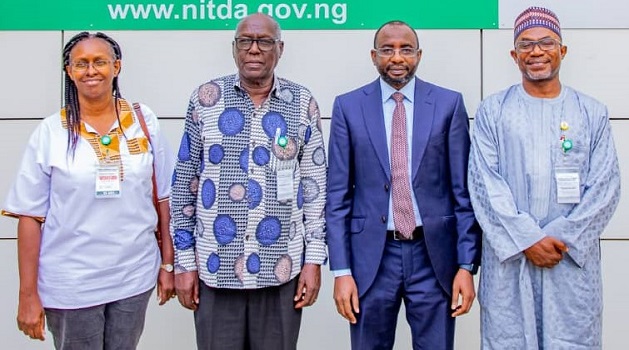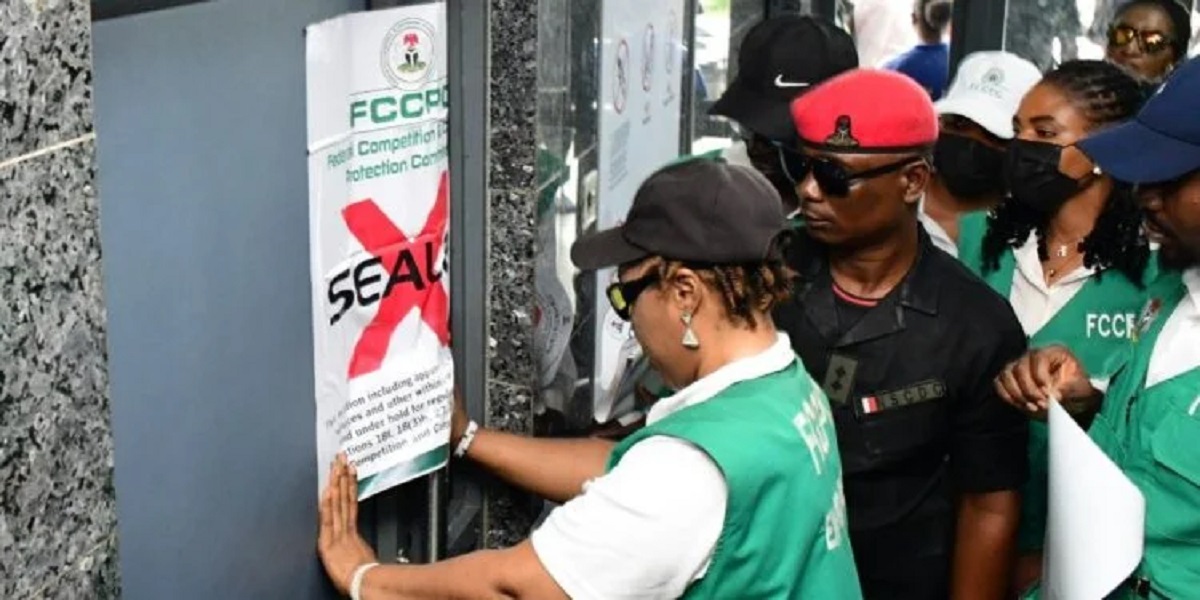News
NITDA to Partner COREN in Driving Engineering Processes

The National Information Technology Development Agency, (NITDA) has expressed its willingness to collaborate with engineering professionals in Africa in order to infuse emerging technological tools, services and knowledge into engineering processes for enhanced productivity and customer satisfaction.

The Director General of NITDA, Kashifu Inuwa CCIE made this known when he played host to a team of the Council for the Regulation of Engineering in Nigeria (COREN), led by its Registrar, Engr. Prof. Adisa A. Bello and a team from the Engineers Board of Kenya, led by its chairman, Engr Erastus K. Mwongera at the Corporate Headquarters of the Agency in Abuja.
The NITDA Director General stated that emerging technologies are reshaping the way engineers design and develop their equipment globally and it is a necessary step in the right direction that Africa adopts it for optimal productivity in its engineering processes.
According to Inuwa, there is need for a convergence between information technology and engineering because it would reduce cost of research and development as well as enhance innovations in real-time to achieve desired results.
“Today we are talking about data and in mechanical engineering for example, there are no longer machines on the field, there are smart and connected machines that are able to generate data for predictive maintainers and predictive analytics”, he buttressed.
While expressing his excitement at the interest in collaboration shown by the visitors, he stated that it would give room to a plethora of opportunities where ideas and expertise can be collectively harnessed to drive Africa to an enviable position.
“I am glad that Africa is now looking inward to see how to put our energies together to develop African countries. Engineers are problem solvers and as long as the solutions are local, it will require local initiative as well,” he stated.
Reiterating that information technology is pervasive and believing that Africa has all it takes to be a global superpower in the fourth Industrial Revolution, Inuwa urged the two visiting engineering bodies to develop existential capabilities and flexibility to survive and thrive.
Reaffirming that technology has been disrupting processes including engineering processes globally; Inuwa disclosed that NITDA has developed various initiatives and strategies in fortifying the innovative ecosystem within and beyond the country.
He said, “At NITDA, we are promoting innovation-driven enterprises and the target is to take it to the global market. We have initiatives that bring the youths together, build ecosystems and build solutions to our problems.”
Eulogizing the impact of information technology on the status quo of existing traditional processes, the NITDA boss stated that information technology has been phenomenally inspirational by enabling creative ideas for enhanced business value propositions and creating new approaches to solving problems.
Inuwa accentuated the need to leverage digital technologies in boosting engineering processes and urged the visitors to fully exploit the three capabilities of Ubiquitous Data where information is collected, analyzed and commercialized, Connectivity, where existential flexibility can be used in harnessing resources from the physical, digital and biological worlds and lastly, Processing Power, where trending devices can be used in enhancing job processes.
“So, if you can use these three capabilities, nothing is impossible in this world and anything you want to do, you can achieve with it,” he assured.
In his earlier remark, Prof. Bello commended NITDA for their milestone achievements over the years and appreciated the Agency for their willingness in collaborating with COREN in deploying Information Technology into engineering processes for enhanced productivity.
In the same vein, Engr. Mwongera in his remark marveled at the extraordinary work being done at the Agency’s National Centre for Artificial Intelligence and Robotics (NCAIR).
He expressed his delight at collaborating with NITDA while using its achievements as benchmarks for up-scaling engineering processes in Kenya and the continent as a whole.
News
DBN Awards N13m in Grants to Tech Startups

Development Bank of Nigeria (DBN) has awarded a total of N13 million in grants to three standout tech startups at the 2025 Techpreneur Summit held in Lagos, reinforcing its commitment to innovation and inclusive growth among Nigeria’s micro, small, and medium enterprises (MSMEs).

The winners include: BuyScrap, a digital marketplace for recyclable materials – N6 million; Qiqi Farms, which connects local farmers to hospitality and export markets – N4 million; Eco-Cyclers, a youth-led recycling initiative based in Enugu – N3 million
Alongside the grant awards, DBN also launched a new digital data asset, a first-of-its-kind platform aimed at enabling data-driven decisions within the MSME ecosystem.
The platform offers deep insights into business trends, sector-specific challenges, and growth opportunities—supporting smarter policymaking and targeted investments.
In his keynote address in Lagos, Tony Okpanachi, managing director/ CEO, DBN, described the event’s theme, “CTRL + SHIFT: Tech Empowered Movement for Naija,” as a strategic call to reimagine enterprise development in Nigeria.
“This isn’t just a keyboard shortcut,” he said. “It’s a mindset reset—powered by technology—to build a more inclusive, innovative, and resilient business landscape. From financing to innovation, DBN remains committed to enabling MSMEs to thrive.”
Okpanachi emphasized that the Summit aligns with DBN’s AMPLIFI Strategy, which integrates digital transformation, sustainability, and scalability into its core programs.
He highlighted initiatives such as the Digital Shift Workshops and the Eco-Innovation Challenge as key steps toward embedding innovation in Nigeria’s MSME sector.
Encouraging young innovators, he added: “The future belongs to those bold enough to imagine and build it. DBN is proud to support the ideas that will shape tomorrow.”
A major highlight was the unveiling of the DBN Data Asset—a digital platform designed to provide real-time, evidence-based insights into Nigeria’s MSME landscape.
The platform combines DBN’s proprietary data with external sources like the National Bureau of Statistics (NBS) to offer a comprehensive view of MSME performance by region and sector.
Jeremy Dan Okayi, DBN’s Head of Strategy, Policy & Innovation, described the platform as: “A reservoir of insight, potential, and direction—built on two years of collaboration and shared vision. This tool will support informed decision-making across the public and private sectors.”
News
FCCPC Shuts France, Belgium, and Italy Visa Centres in Abuja Over Alleged Consumer Rights Violations

In a bold enforcement action, the Federal Competition and Consumer Protection Commission (FCCPC), supported by the Nigeria Police Force and the Nigeria Security and Civil Defence Corps (NSCDC), has sealed off the visa application centres of France, Belgium, and Italy in Abuja over alleged consumer protection breaches and obstruction of regulatory investigations.

The affected centres—located at Mukhtar El-Yakub House in the Central Business District and operated by TLS Contact, a Teleperformance Company—were shut down following reports that they refused to accept formal correspondence from the FCCPC regarding a consumer complaint. The Commission cited further infractions, including obstruction of investigation and alleged assault of its officers during lawful duties.
Speaking to journalists at the scene, Mrs. Boladale Adeyinka, Director of Surveillance and Investigations at the FCCPC, explained: “This is an enforcement operation against TLS. On March 25, 2025, we served them a letter to address a consumer complaint, which they refused to accept. Instead, TLS officers assaulted our team, and in a subsequent visit on June 17, they also allegedly assaulted uniformed police officers.”
Citing Section 33 of the Federal Competition and Consumer Protection Act (FCCPA), Mrs. Adeyinka emphasized that failure to comply with Commission directives constitutes a criminal offense, punishable by imprisonment, fines of up to ₦20 million, or both.
TLS has been ordered to appear before the Commission on June 20, 2025, to provide testimony, submit evidence, and make formal depositions. The company may be held liable for any financial losses suffered by applicants due to the disruption of visa services.
Despite multiple requests for comment, management at TLS Contact declined to respond as of press time.
News
How and Why N210 Trillion is Missing in NNPCL – CFO

Adedapo Segun, chief financial officer (CFO), Nigerian National Petroleum Company Limited (NNPC), has explained why there is a missing sum of N210 trillion in the company’s audited financial statement spanning from 2017 to 2023.

According to Segun, the missing funds are cash calls requested by joint venture (JV) partners and settlement to the JVs.
He spokeat a session of the Senate Committee on Public Accounts chaired by Aliyu Wadada.
Segun was responding to an alarm raised by the committee over missing N210 trillion in NNPCL’s audited financial statement.
Recall that Wadada issued a one-week ultimatum to NNPCL to account for the missing N210 trillion.
Reacting, Segun said, “The N103 trillion and N107 trillion are made up of joint venture cash calls that have been requested by the JV operators and JV cash call payments made by NNPCL, which are yet to be reconciled because governance procedures were not done at that time.
“That is why you see the description reflecting those two items would be washed out because they are two sides of the same transaction, which is the cash calls by JV partners and the settlement by NNPCL.”
However, Habu Sadeik, a financial analyst, in a post on X on Thursday, said Segun’s response was unsatisfactory.
Saidik faulted NNPCL’s response about the fund discrepancies, noting that something is not right with the audited financial statement.
“Forget about the senators’ lack of knowledge.
“The CFO’s response is not satisfactory. Are you saying that cash calls worth hundreds of trillions are just appearing on your FS only in 2024 without 31 disclosure?
“If it’s a cash call, why hasn’t the disclosure said so?
“Which cash call is over 100 trillion?
“Something is definitely not right, and I hope they retrospectively correct that FS.
“Someone somewhere did a chef’s work,” he wrote on X.

 News3 days ago
News3 days agoLasaco Assurance to Invest in Technologies, Systems to Deliver Value to Clients

 E-Financial3 days ago
E-Financial3 days agoNIBSS National Payment Stack to Transform Nigerian Instant Payments

 Telecom19 hours ago
Telecom19 hours agoMafab Gets 0724 Number Series, Launches Mcom 5G Brand

 General News3 days ago
General News3 days agoMoniepoint Demonstrates Commitment to Nurturing Africa’s Future Leaders

 E-Financial3 days ago
E-Financial3 days agoCBN Reaffirms Banking Sector Resilience as Forbearance Ends

 News2 days ago
News2 days agoHow and Why N210 Trillion is Missing in NNPCL – CFO

 News2 days ago
News2 days agoPalmPay, Glo Launch “Recharge and Win Bonanza 2” with Exciting Prizes

 General News2 days ago
General News2 days agoIHS Nigeria, United Nations Global Compact Host High-Level Dialogue on Sustainability and Greener Business Practices in Nigeria



























